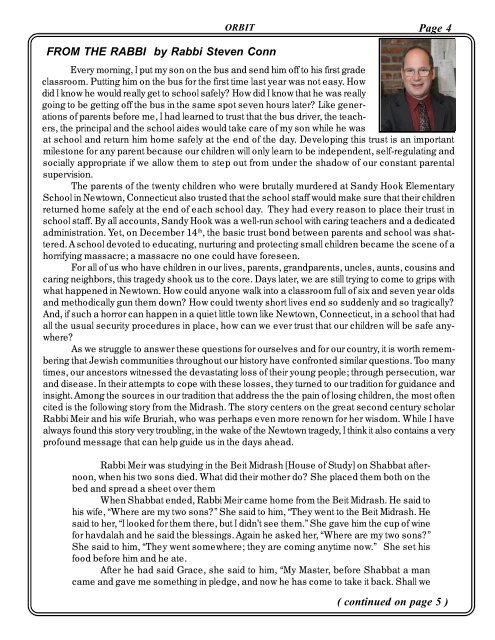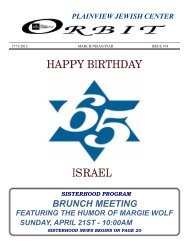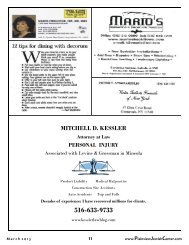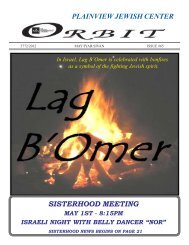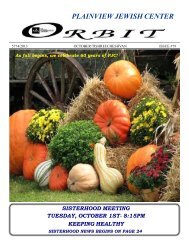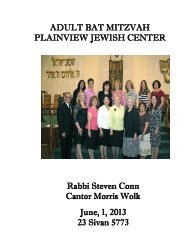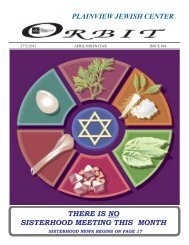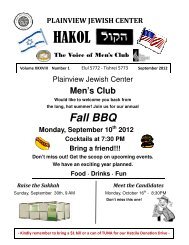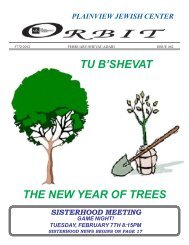Orbit January, 2013 - Plainview Jewish Center
Orbit January, 2013 - Plainview Jewish Center
Orbit January, 2013 - Plainview Jewish Center
You also want an ePaper? Increase the reach of your titles
YUMPU automatically turns print PDFs into web optimized ePapers that Google loves.
ORBIT<br />
Page 4<br />
FROM THE RABBI by Rabbi Steven Conn<br />
Every morning, I put my son on the bus and send him off to his first grade<br />
classroom. Putting him on the bus for the first time last year was not easy. How<br />
did I know he would really get to school safely? How did I know that he was really<br />
going to be getting off the bus in the same spot seven hours later? Like generations<br />
of parents before me, I had learned to trust that the bus driver, the teachers,<br />
the principal and the school aides would take care of my son while he was<br />
at school and return him home safely at the end of the day. Developing this trust is an important<br />
milestone for any parent because our children will only learn to be independent, self-regulating and<br />
socially appropriate if we allow them to step out from under the shadow of our constant parental<br />
supervision.<br />
The parents of the twenty children who were brutally murdered at Sandy Hook Elementary<br />
School in Newtown, Connecticut also trusted that the school staff would make sure that their children<br />
returned home safely at the end of each school day. They had every reason to place their trust in<br />
school staff. By all accounts, Sandy Hook was a well-run school with caring teachers and a dedicated<br />
administration. Yet, on December 14 th , the basic trust bond between parents and school was shattered.<br />
A school devoted to educating, nurturing and protecting small children became the scene of a<br />
horrifying massacre; a massacre no one could have foreseen.<br />
For all of us who have children in our lives, parents, grandparents, uncles, aunts, cousins and<br />
caring neighbors, this tragedy shook us to the core. Days later, we are still trying to come to grips with<br />
what happened in Newtown. How could anyone walk into a classroom full of six and seven year olds<br />
and methodically gun them down? How could twenty short lives end so suddenly and so tragically?<br />
And, if such a horror can happen in a quiet little town like Newtown, Connecticut, in a school that had<br />
all the usual security procedures in place, how can we ever trust that our children will be safe anywhere?<br />
As we struggle to answer these questions for ourselves and for our country, it is worth remembering<br />
that <strong>Jewish</strong> communities throughout our history have confronted similar questions. Too many<br />
times, our ancestors witnessed the devastating loss of their young people; through persecution, war<br />
and disease. In their attempts to cope with these losses, they turned to our tradition for guidance and<br />
insight. Among the sources in our tradition that address the the pain of losing children, the most often<br />
cited is the following story from the Midrash. The story centers on the great second century scholar<br />
Rabbi Meir and his wife Bruriah, who was perhaps even more renown for her wisdom. While I have<br />
always found this story very troubling, in the wake of the Newtown tragedy, I think it also contains a very<br />
profound message that can help guide us in the days ahead.<br />
Rabbi Meir was studying in the Beit Midrash [House of Study] on Shabbat afternoon,<br />
when his two sons died. What did their mother do? She placed them both on the<br />
bed and spread a sheet over them<br />
When Shabbat ended, Rabbi Meir came home from the Beit Midrash. He said to<br />
his wife, “Where are my two sons?” She said to him, “They went to the Beit Midrash. He<br />
said to her, “I looked for them there, but I didn’t see them.” She gave him the cup of wine<br />
for havdalah and he said the blessings. Again he asked her, “Where are my two sons?”<br />
She said to him, “They went somewhere; they are coming anytime now.” She set his<br />
food before him and he ate.<br />
After he had said Grace, she said to him, “My Master, before Shabbat a man<br />
came and gave me something in pledge, and now he has come to take it back. Shall we<br />
( continued on page 5 )


